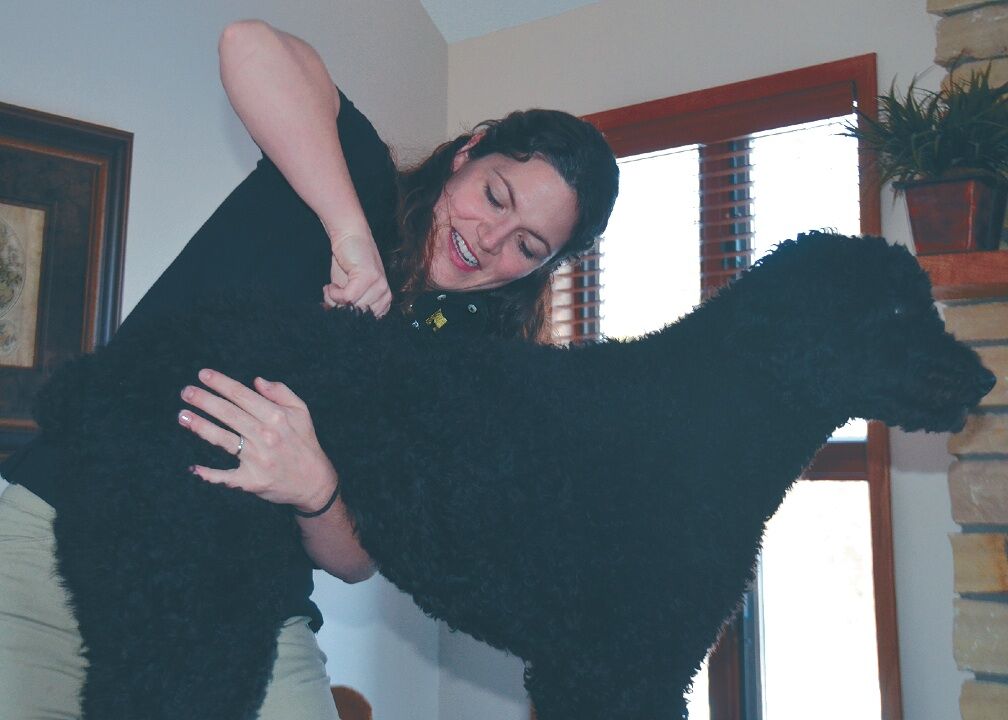RURAL SOLON- As you pull into the driveway of Jake and Helen Beck’s home, a pair of horses trot over to the fence to look you over.
It’s no surprise the equines are there. Horses have been a large part of Helen’s life, and now they make up most of her veterinary practice.
Helen Beck, DVM, provides veterinary care, primarily to horses. She’s also one of a growing number of animal chiropractors providing adjustments to traditional family pets such as dogs and cats, with the background and knowledge to care for almost any of God’s creatures, great or small.
A native of Cascade, the doctor attended Loras College in Dubuque for four years of biochemistry before embarking on four years of veterinary school at Iowa State University in Ames.
“I always knew I wanted to be a vet,” she said adding, “I’ve never wanted to be anything other than a vet.”
After graduating in 2008 with her doctorate in veterinary medicine, Dr. Beck worked in a private practice, as she said, “developing my skill set,” when she noticed animals who weren’t overtly lame, didn’t have an obvious injury, yet they didn’t look comfortable carrying themselves. “They just didn’t look right,” she said. “(As a vet), you look at your skill set and it’s like, what traditional medicine can we do to help this animal?” She was working with veterinarians trained in chiropractic, and said, “having that alternative, complementary aspect to it, I saw wonders in those animals.” Seeing positive results led Dr. Beck to take additional specialized training in animal chiropractic care.
“It’s becoming more mainstream,” Dr. Beck said. “They have a spine, just like we have a spine, they have the same type of pathology (as humans), the principles are all the same. You’re just trying to restore normal motility (ability of movement) of each vertebral joint. You’re trying to reduce muscle spasm, any type of edema.” The doctor said initially she had no idea how chiropractic care worked, “I just knew it worked for people.” As she progressed through the training, the science of chiropractic intrigued her.
The Veterinary Medical Association, she pointed out, is giving more and more consideration to chiropractic care, and is looking at ways to standardize the practice. “When I took the course work, it was both human chiropractors and veterinarians.” She said it was interesting having two different professions, and two different perspectives learning side-by-side. “But depending on what state you practice in, some states consider animal chiropractic a veterinary procedure so a non-veterinary chiropractor could not, legally, adjust. There’s still some gray area there.”
Dr. Beck knows of two other animal chiropractors in the corridor area. A web search turned up seven in Iowa certified by the American Veterinary Chiropractic Association, which includes both doctors of chiropractic and doctors of veterinary medicine.
She later took a position with the U.S. Department of Agriculture (USDA) in West Liberty before pursuing her own veterinary and chiropractic practice, Beck Equine & Chiropractic, which was established in August 2013.
“I’ve modeled my business to be more routine equine care. We debated as a family quite a bit as to whether I was going to do emergency services. Right now I’m doing the routine things, dentistry, vaccines, general wellness exams, and farrier consults, as opposed to being on-call 24-7-365.” Dentistry and chiropractic have quickly become the bulk of her practice.
“The beauty of dentistry is, especially doing a horse, you’ve got the client right there and you can show them a ‘before,’ and once you get the mouth open, they can see the sharp points, the pathology. They know it’s causing issues. You go in, you float them, you take care of the issues and you can show them an ‘after’ and they love it.” As with humans, preventative dental care can make a tremendous difference. “If you get on those horses at a young age, and correct any problems they have, it helps them throughout their life.” Some who scoff at dental care for horses point to horses living in the wild that have never known the feel of a veterinary file. “Horses in the wild don’t live to be 20, 25, 30 years old. The life expectancy for horses is getting so long, so this can really help them.”
Dr. Beck travels to her clients’ locations for a variety of reasons including, especially in the case of chiropractic visits, the comfort of the client’s animal being in their own familiar environment. She also relies heavily on the animal’s owner to help with diagnosing the problem along with her observations.
“What’s interesting in the veterinary world, you have people who are very astute to their animal’s habits, and they will notice the most minute changes, and they’re accurate in their observations. Then others won’t notice changes. You do the best you can.” On the chiropractic side, she said, many owners are attuned to the comfort of their animals, noticing if they are more reluctant to jump up into the car, or looking uncomfortable lying down, for example.
The Becks chose the Solon-Shueyville area to settle, and Dr. Beck started her practice after she left the USDA.
“This is something I’ve always wanted to do, and I really missed the client interaction, seeing patients, practicing medicine. I decided if I don’t try now, when am I going to?” The Becks knew they wanted to be located close to the corridor and have some land. “We absolutely love it here,” she said. Trails, the lake and the strong reputation of the Solon schools also drew them in, along with the ability to have horses. “I feel like we kind of found this place as a diamond in the rough.”
Dr. Beck can be contacted at 319-640-0921 or through her website, www.equineandchiro.com. She can also be found on Facebook at https://www.facebook.com/equineandchiro.
Adjustments for (almost) all of God’s creatures
January 16, 2014
About the Contributor
Chris Umscheid, Editor
Chris Umscheid is the editor of the Solon Economist.

